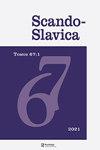Пассивизация непереходных глаголов в русском языке: существует ли системный запрет?
IF 0.2
0 HUMANITIES, MULTIDISCIPLINARY
引用次数: 0
Abstract
ABSTRACT The article challenges the traditional theory according to which only transitive verbs can have passive voice forms in Russian. Based on the Russian National Corpus and texts found on the Internet, the paper shows that the grammatical system of Russian permits the passivization of oblique-complement verbs and verbs that govern prepositional phrases. The analysis shows that whether or not a verb permits the formation of passive voice forms depends on the communicative status of the complement rather than its grammatical form, while the semantic and morphonological restrictions on passivization equally apply to verbs regardless of the form of their complements. The paper gives evidence confirming that some passive voice forms are loan translations from other languages, but argues that the use of the loan translation mechanism does not bring about anything that contradicts the rules of Russian grammar, but rather leads to a more comprehensive implementation of previously unused capabilities of the grammatical system.在俄语中,非过渡动词的被动化:有系统禁止吗?
本文对俄语中只有及物动词才有被动语态的传统理论提出了挑战。基于俄语国家语料库和网络上的文本,本文表明俄语的语法系统允许斜补语动词和介词短语动词的被动化。分析表明,动词是否允许被动语态的形成取决于补语的交际状态,而不是它的语法形式,而被动化的语义和形态限制同样适用于动词,无论补语的形式如何。本文提供了证据,证实了一些被动语态是从其他语言借来的翻译,但认为使用借来的翻译机制不会带来任何与俄语语法规则相矛盾的东西,而是导致语法系统以前未使用的功能得到更全面的实现。
本文章由计算机程序翻译,如有差异,请以英文原文为准。
求助全文
约1分钟内获得全文
求助全文

 求助内容:
求助内容: 应助结果提醒方式:
应助结果提醒方式:


